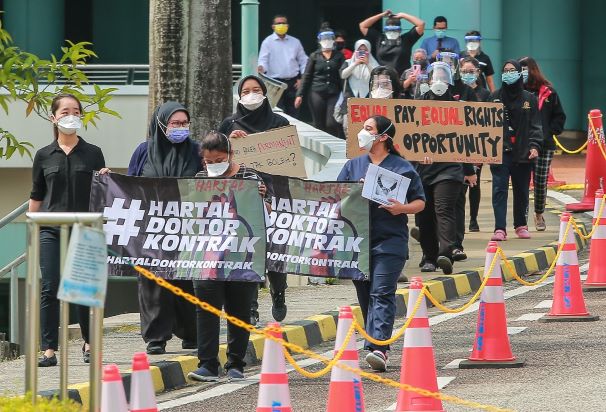Adeeba: UM Loses 30 Of Its Best & Brightest Medical Grads To Singapore Yearly
Dr Adeeba Kamarulzaman, who is an acclaimed infectious diseases expert, said there's an urgent need to plug the brain drain of medical officers and graduates to improve Malaysia's public healthcare system.
Malaysia urgently needs to plug the brain drain of fresh medical graduates and medical officers caused by a lack of posts and clear training, according to Datuk professor Dr Adeeba Kamarulzaman
To highlight how severe the issue of brain drain is in the country, the former dean of the Faculty of Medicine and professor of infectious diseases at Universiti Malaya (UM), pointed out that UM loses at least 30 of its "best and brightest" to Singapore every year.
This happens due to a lack of opportunities in Malaysia, thus forcing doctors, nurses, and other health professionals to look abroad for employment, affecting the country's public healthcare system.
She brought this up in a tweet today, 22 December, while responding to an article on CodeBlue on how hospitals should not leave it to the emergency department (ED) alone to handle patients.
Recently, critically ill patients, including ventilated cases, were left stranded for up to six days in Raja Permaisuri Bainun Hospital's (HRPB) emergency department due to insufficient critical care beds and staff.
Adeeba reminded that it costs the government almost RM1 million per student to train, only for them to look for opportunities elsewhere
"Now, we are also apparently going to help plug the National Health Service (NHS) shortage (in the UK) by also sending our medical officers to the UK," she said, adding that she doesn't blame her young colleagues.
"I, too, would go where the opportunities are. We are failing them. How can we expect to build a resilient and world-class health system when we have this continuous internal and external brain drain?"
The acclaimed infectious disease expert's reminder comes as the pandemic lay bare the issues in Malaysia's public healthcare system
Recently, the Healthcare Work Culture Improvement Task Force, under the Ministry of Health (MOH), conducted a survey involving some 100,000 staff members in the country, over four months.
A lack of human resources and infrastructure are among some of the issues.
It also found that there were "varying levels" of burnout and bullying in public healthcare facilities.
According to the survey, lack of efficiency, skills, and preparation for the work that the employees had been assigned were among the "contributing factors" to the incidents of burnout and bullying.
The task force also found that healthcare workers are overworked and subject to long working hours due to the different hospitals' failure to comply with guidelines set by the ministry.
While acknowledging that there is a culture of bullying junior doctors, the Malaysian Medical Association said the current training system should remain to prepare them for the hard life of being a doctor.
The issues became so dire during the peak of the COVID-19 crisis that a social media campaign known as #HartalDoktorKontrak was formed to speak up for the healthcare professionals and put pressure on MOH to improve working conditions, benefits, and career pathways for medical officers here.
